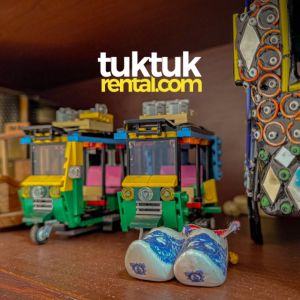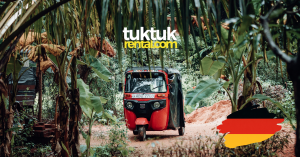Author : Avantika Chaturvedi
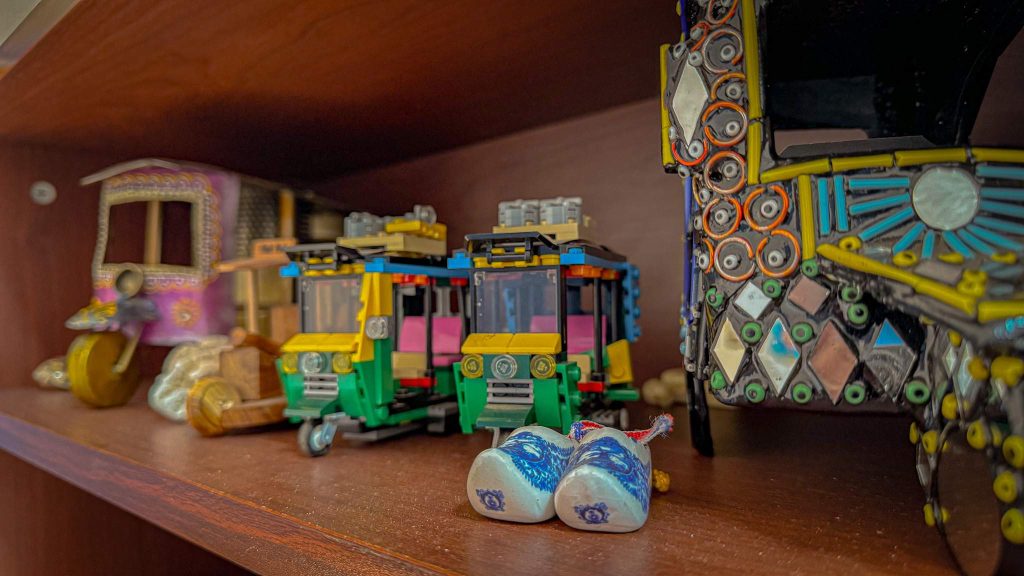
Sri Lanka is an island nation with diverse cultures, a rich heritage and a long history, making it a paradise for shopping enthusiasts looking for unique and meaningful souvenirs to take back home. Whether you are a traveler currently in Sri Lanka searching for the best keepsakes or someone preparing for your trip and planning your shopping list in advance, this guide to the best things to buy from Sri Lanka will help you make informed and culturally sensitive choices. From handcrafted masks to world renowned teas, traditional instruments and more, Sri Lanka offers an array of authentic and high quality products that will allow you to take a piece of this beautiful island home with you!
Ceylon Tea: The World’s Finest Tea
Ceylon Tea is one of Sri Lanka’s most important exports, and is easily one of the best things to buy from Sri Lanka as a souvenir. Sri Lanka, formerly known as Ceylon, became a tea haven during British rule in the early 1800s. Ever since, tea cultivation has flourished in the island’s central highlands, especially regions like Kandy, Nuwara Eliya, Ella and Hatton. Sri Lanka’s combination of unique climate, altitude, and soil conditions contribute to the distinct flavour profiles of Ceylon tea, setting it apart from other teas.
Depending on where the tea has been grown and in what conditions, it can give you floral, citrusy, malty and even earthy, grassy flavour notes. Ceylon Tea also comes in a lot of varieties including black, green, white, and flavoured teas infused with cinnamon (one of Sri Lanka’s top spices), vanilla, or cardamom.
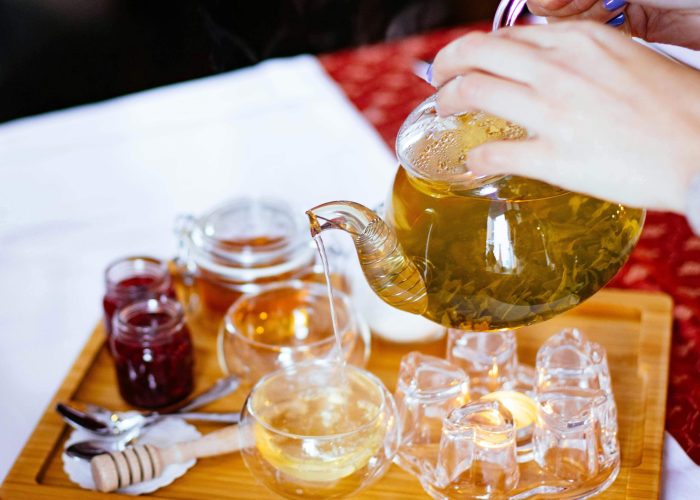
Where to Buy Ceylon Tea in Sri Lanka
Tea Plantations and Factories
For the freshest and most authentic experience, visit a tea estate where you can see the tea making process and sample different varieties before purchasing.
- Nuwara Eliya: Known as the “Champagne of Ceylon Tea,” high grown teas from estates like Pedro Tea Estate and Mackwoods Labookellie Tea Centre offer light, aromatic flavours.
- Ella: Visit Halpewatte Tea Factory, one of the largest in the region, for robust teas.
- Kandy: The birthplace of Ceylon tea, with estates like Ceylon Tea Museum offering a historic perspective.
Tea Boutiques and Specialty Shops
For high-end, well-packaged tea with a variety of flavours:
- Dilmah T-Lounge (Colombo and other cities): Premium, single-origin teas with unique blends.
- Basilur Tea (Colombo, airport and malls): Aesthetic packaging with a focus on gift worthy tea collections.
- Mlesna Tea Centers: Offers a wide range of flavoured and classic teas.
Local Markets & Supermarkets
For affordable options, try:
- Laksala (Government owned gift and souvenir boutique)
- Supermarkets like Arpico, Keells and Cargills
Duty Free Shops (Bandaranaike International Airport)
For last-minute purchases, duty free tea shops at the airport offer well-packaged, export-quality tea.
Pro Tip: Opt for loose-leaf tea over tea bags for a richer flavour, and look for “Pure Ceylon Tea” certification to ensure authenticity.
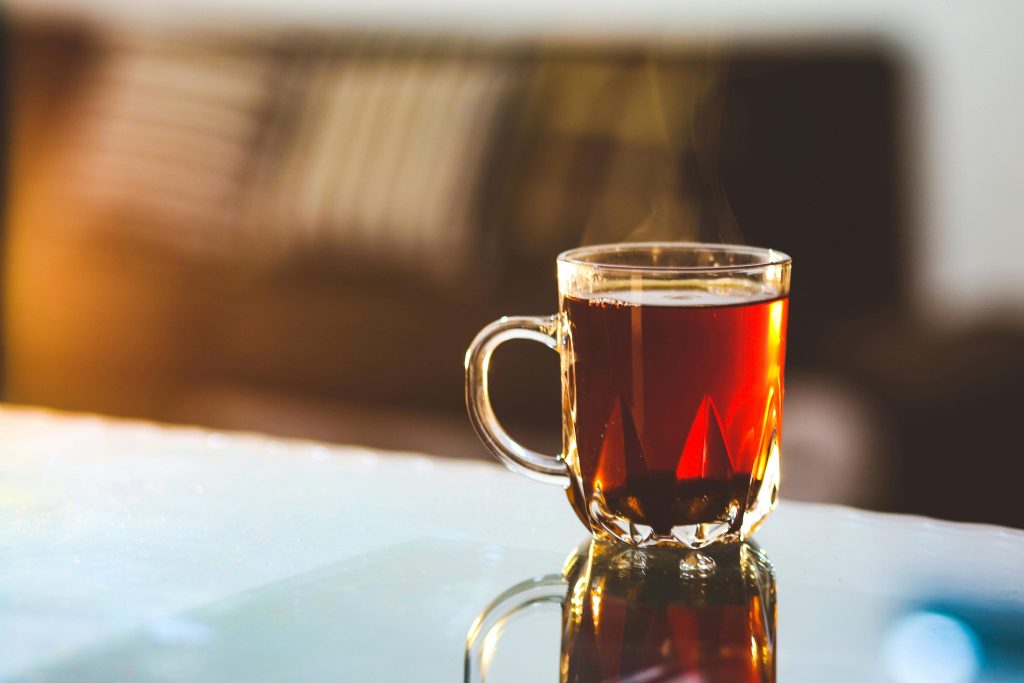
Handcrafted Wooden Masks
Sri Lanka’s traditional wooden masks are an iconic representation of the island’s rich artistic and cultural heritage. Used in rituals, healing ceremonies, and dramatic performances, these masks are intricately hand carved and painted with vibrant colours, representing mythological and spiritual beliefs. They are crafted primarily from Kaduru wood (Satinwood), a lightweight and durable material.
Sri Lankan masks are deeply rooted in folklore and are classified into three main types. Raksha or Demon Masks are used in traditional processions and dance performances, depicting fierce and mythical creatures like the Naga Raksha (Cobra Demon) or Gurulu Raksha (Bird Demon). They symbolise protection and ward off evil spirits. Kolam or Storytelling Masks are used in folk theater performances called Kolam Natima, portraying characters from Sri Lankan folklore, including kings, queens, and comedic figures. Finally, the Sanni or Healing Masks are linked to Ayurveda and traditional healing rituals. The 18 Sanni masks represent different illnesses, and are used in exorcisms to cure ailments believed to be caused by supernatural forces.
Sri Lankan traditional masks are not just stunning decorative pieces but also hold deep cultural significance, making for the perfect Sri Lankan souvenir!
Where to Buy Wooden Masks in Sri Lanka
- Ambalangoda is the heart of mask carving in Sri Lanka, with workshops and museums like the Ariyapala Mask Museum.
- Artisan shops and craft centers across the island.
Laksala, the government-run handicraft and souvenir store, offers authentic masks.
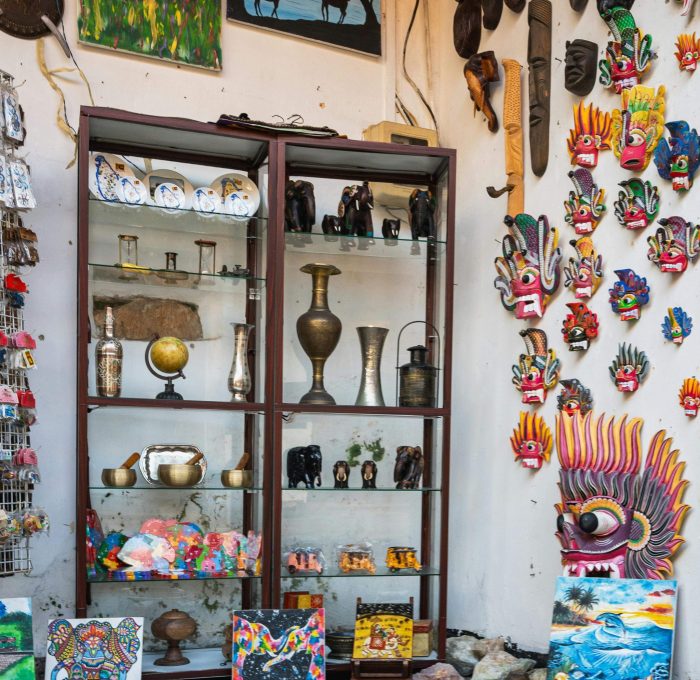
Ayurvedic and Herbal Products
Ayurveda is an important part of Sri Lankan culture, an ancient healing system that has been practiced for over 3,000 years. Rooted in natural remedies and holistic wellness, Sri Lankan Ayurvedic and herbal products are made from locally sourced medicinal plants, spices, and oils. These products are popular among tourists looking for authentic, natural wellness solutions. Sri Lanka has a rich history of Ayurveda, and its herbal wellness products are renowned worldwide. From herbal oils and balms to soaps and organic skincare, these natural products make perfect gifts or personal wellness treats.
Where to buy Ayurvedic products in Sri Lanka:
- Ayurvedic pharmacies and wellness centers (Panchakarma centers, Ayurvedic hospitals)
- Reputable brands such as Siddhalepa, Barberyn Ayurveda, and Spa Ceylon.
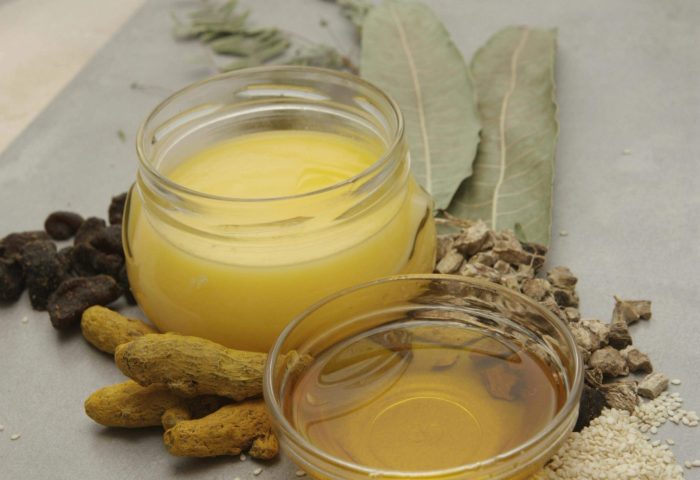
Sri Lankan Spices
Sri Lanka has been a global hub for spices for centuries, earning it the nickname “Spice Island.” The country’s warm climate and fertile soil produce some of the world’s finest spices, known for their rich aromas and medicinal properties. Spices are also an essential part of Sri Lankan cuisine, Ayurveda, and local culture, making them a meaningful and practical Sri Lankan souvenir to bring home.
Some of Sri Lanka’s best spices include Ceylon Cinnamon (True Cinnamon), cardamom, cloves, black pepper, nutmeg and mace. Pure Ceylon cinnamon (Cinnamomum verum) is also sweeter and more delicate than Cassia cinnamon found commonly elsewhere in the world.
Where to buy spices in Sri Lanka:
- Spice gardens in Matale or Kandy for fresh, organic spices.
- Local Markets like Pettah Market in Colombo for bulk spices at great prices.
- Supermarkets and specialty stores like Ceylon Spice Company for neatly packaged, high quality selections.
Handloom and Batik Fabrics
Sri Lanka’s textile artistry is nothing without its handloom weaving and batik fabric dyeing practices, standing out as two of the most unique and culturally significant crafts in the country. These textiles are not only visually stunning but also deeply rooted in Sri Lankan heritage, dating back thousands of years and passed down through generations. Artisans use traditional wooden looms to create intricate patterns and textures mainly on cotton and silk threads, making them a meaningful and stylish souvenir, whether in the form of sarongs, shawls, scarves, sarees and more.
Batik, on the other hand, is a traditional fabric dyeing technique introduced to Sri Lanka centuries ago and is believed to have Indonesian roots. The process involves applying wax to fabric in intricate designs, then dyeing it to create beautiful, layered patterns. Once the wax is removed, the final design is revealed, often featuring Sri Lankan motifs such as elephants, peacocks, lotus flowers, and traditional dancers.
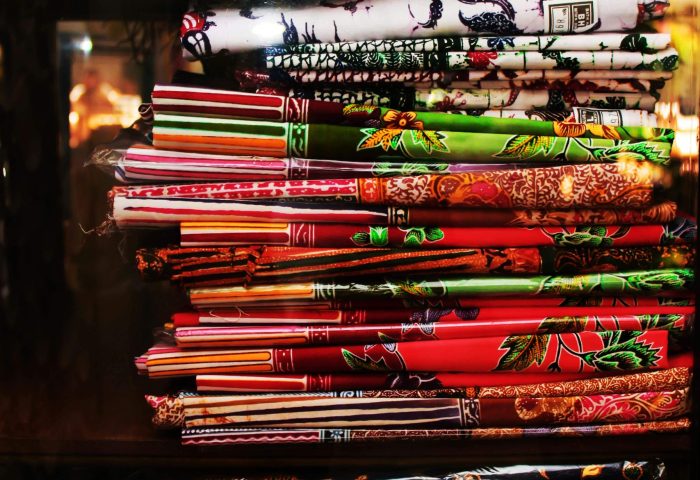
Where to buy Batik and other handloom in Sri Lanka:
- Barefoot (Colombo, Galle) – A renowned handloom boutique known for high quality, contemporary designs with bold colours.
- Selyn Fair Trade (Colombo, Kandy, Galle) – Sri Lanka’s only fair trade certified handloom company.
- Local markets and village craft centers.
- Laksala (Government Handicraft Store) for authentic products from artisans across Sri Lanka.
- Buddhi Batiks (Colombo & Galle) – A contemporary brand blending traditional techniques with modern fashion.
- Jayamali Batiks (Kandy) – Specializing in hand painted batik clothing.
Gemstones and Jewellery
Of the many nicknames this island nation has, Sri Lanka is also known as the “Gem Island”, thanks to being renowned for its precious and semi precious gemstones for over 2,500 years. The country’s gem industry is one of the finest in the world, offering high quality stones including blue sapphires, moonstones, and topaz that are ethically mined and handcrafted into exquisite jewellery.
Ceylon Sapphires (cornflower blue sapphires), the Padparadscha Sapphire (a rare pink orange variety) and Moonstones (iridescent gems found in Meetiyagoda) are some of the most sought after gemstones in Sri Lanka. If you are looking for a valuable and timeless Sri Lankan souvenir, these gemstones are an excellent choice!
Where to buy gemstones jewellery in Sri Lanka:
- Ratnapura, the gem capital of Sri Lanka, is he heart of Sri Lanka’s gem industry. You can visit mines and workshops here.
- Government certified gem stores in Galle.
- Reputed jewellers such as Zam Gems, Colombo Jewellery Stores, and Raja Jewellers in Kandy and Colombo
Pro Tip: Always request a Certificate of Authenticity to ensure you’re getting a genuine gemstone.

Traditional Sri Lankan Lacquerware
Lacquerware, known as “Laksha” in Sri Lanka, is an ancient handicraft that dates back over a thousand years. This traditional art form involves decorating wooden objects with vibrant layers of natural lacquer, derived from the sap of the Lac tree, often featuring intricate designs in red, black, yellow, and green. These designs are hand etched, applied using a technique called “punctured engraving”. Sri Lankan lacquerware is both decorative and functional, making it a unique souvenir that showcases the island’s rich craftsmanship.
Decorative bowls, ornaments, traditional bangles and jewellery, and even furniture are some lacquerware souvenir inspiration for you to take back home!
Where to buy traditional Sri Lankan lacquerware:
- Matale and Kandy – The heart of traditional lacquerware production, with local workshops where you can see artisans at work.
- Laksala and other government-approved handicraft stores.
Coconut Shell Crafts
Anyone at first glance in the country can tell how abundant coconuts are in Sri Lanka. But not many may know that Sri Lanka has a deep rooted tradition of utilizing every part of the coconut tree. Among the many coconut based products found across the island nation, coconut shell crafts stand out as a unique, eco friendly, and skillfully handcrafted souvenir.
Coconut shells are carefully cleaned, cut, and polished by artisans to create intricate designs including beautiful bowls, cutlery, and jewellery. Some items are even hand carved with traditional motifs, floral patterns, or geometric designs, adding to their aesthetic appeal. The shells’ natural durability and rich brown texture make them an ideal material for a variety of handicrafts.
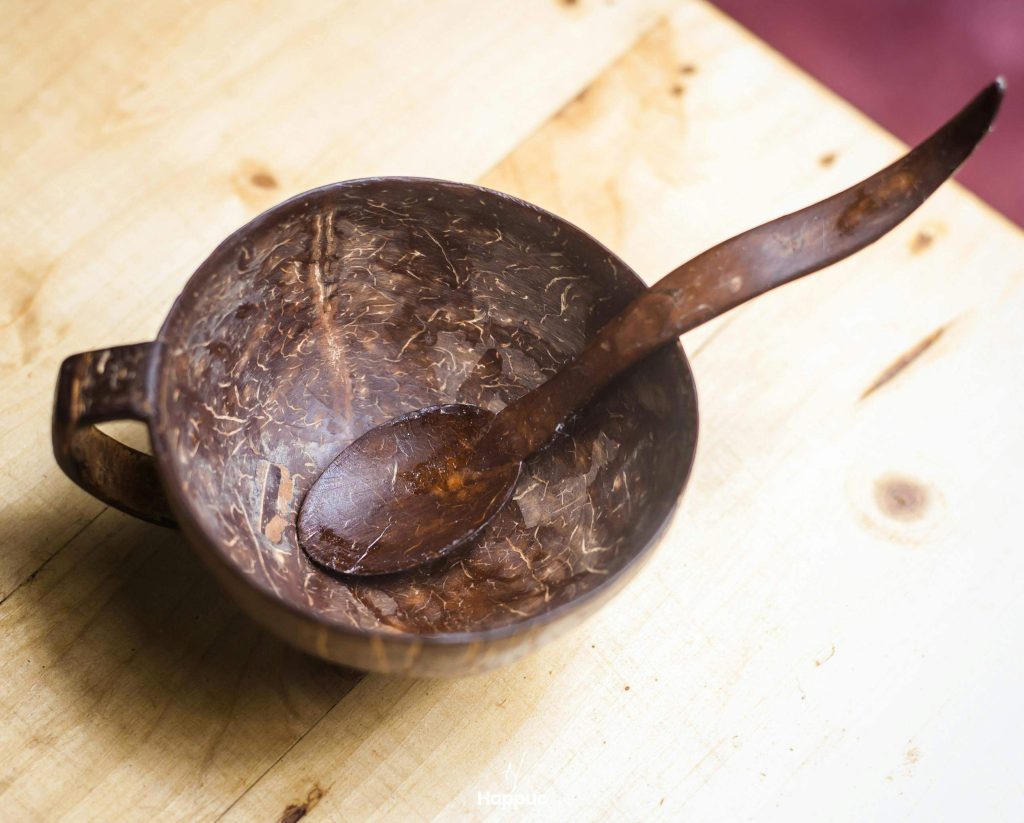
Where to buy coconut shell crafts in Sri Lanka:
- Good Market Colombo, a hub for sustainable shopping.
- Local markets and handicraft villages found in Kandy, Galle, and Colombo.
- Laksala (Government Handicraft Store) guarantees authenticity and fair trade.
Elephant Dung Paper Products
Sri Lanka is undeniably known for its large population of Asian elephants, so much so that while renting a tuktuk in Sri Lanka and travelling through the B35 Elephant Road you are almost certainly going to see wild elephants roaming on the road! In recent years, the country has embraced a sustainable and innovative way to utilise elephant waste and pioneered paper making using elephant dung.
This eco friendly craft not only transforms elephant dung into high quality paper products, but also offers a sustainable alternative to traditional paper while supporting elephant conservation efforts. And these products ultimately make for incredible Sri Lanka souvenirs making it a win win situation from all sides! You can buy notebooks and journals, greeting cards, postcards, bookmarks and all other kinds of stationery made from elephant dung in Sri Lanka!
Where to buy elephant dung paper products in Sri Lanka:
- Maximus Elephant Dung Paper (Kegalle, near Pinnawala Elephant Orphanage) – One of the most famous brands producing ethical, sustainable paper products.
- Gift shops in national parks and eco-tourism centers.
Beeralu Lace Products
Beeralu lace, also known as bobbin lace, is one of Sri Lanka’s most intricate and delicate traditional crafts. This centuries old lace making technique was introduced by the Portuguese and Dutch during the colonial era and has since evolved into a uniquely Sri Lankan art form. The southern coastal regions, especially Galle and Matara, are famous for their skilled lace artisans who meticulously handcraft Beeralu lace using wooden bobbins, fine thread, and a specially designed lace pillow to hold the pattern in place. Beeralu lace, a traditional handmade lace craft, is a delicate and elegant souvenir.
Where to buy Beeralu Lace products:
- Galle Fort craft shops.
- Local lace makers in villages like Weligama and Matara in the south.
Sri Lankan Musical Instruments
Sri Lanka’s vibrant culture also extends to its rich musical heritage deeply rooted in Buddhist and folk traditions. The country’s traditional musical instruments play a vital role in religious ceremonies, folk dances, and festive occasions. Many of these instruments have been used for centuries and are handcrafted by skilled artisans using natural materials like wood, animal hide, and metal. So if you are a music lover, traditional instruments like the rabana (a circular, one sided hand drum) and thammattama (twin drums similar to the Indian tabla) make for fascinating Sri Lankan souvenirs worth buying!
Where to buy Sri Lankan musical instruments:
- The souvenir shop at Ambuluwawa Temple has many traditional Sri Lankan instruments you can try out and buy.
- Local artisan workshops in villages like Embekka in Kandy.
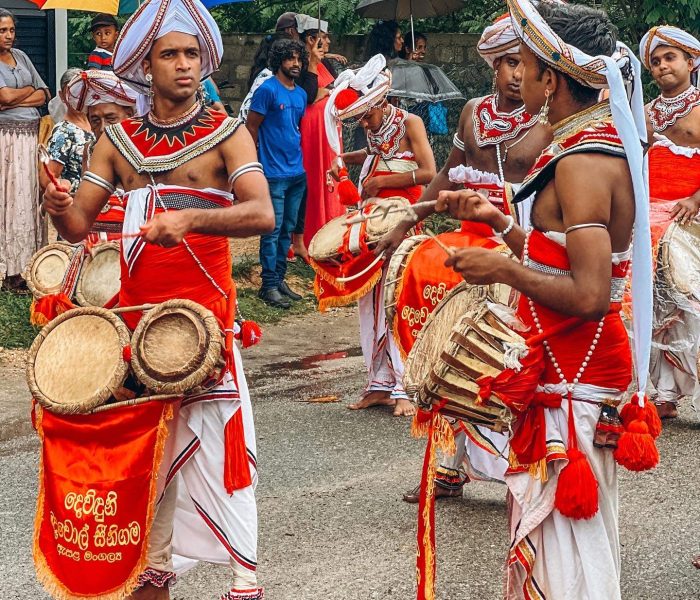
Clay Pottery
Clay pottery is one of Sri Lanka’s oldest and most enduring crafts. So much so that it is not just a craft but also an essential part of daily life, used as traditional cookware such as kurun pots (used for slow cooking curries) and mutti pots (used to aturally cool water and add an earthy taste). Skilled artisans use locally sourced clay suchs as kirimeti (soft white clay) and the commonly found red clay, which is molded, sun dried, and fired in traditional kilns.
Many designs are inspired by ancient Sinhalese motifs and Buddhist art, making each piece unique and one of the best things you can buy from Sri Lanka for keepsakes!
Where to buy clay pottery in Sri Lanka:
- Molagoda Village (Kegalle District) – Known as the “Pottery Village of Sri Lanka”, where artisans create high quality handmade clay items.
- Laksala (Government Handicraft Store) – A reliable place for authentic pottery pieces.
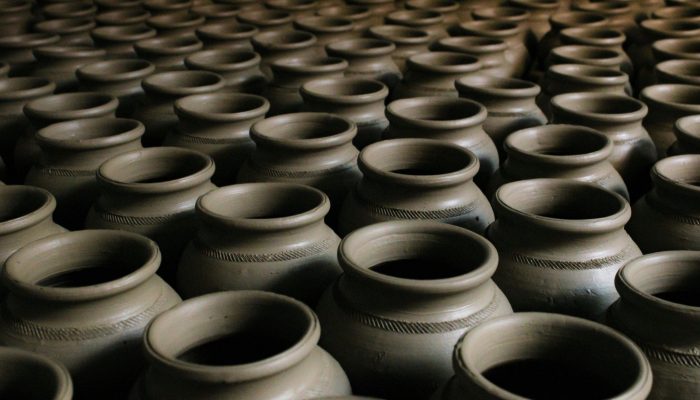
FAQs
Sri Lanka is known for its high-quality natural and handmade products. Ceylon tea is among the finest in the world, with a variety of flavours from different regions. Spices like cinnamon, pepper, and cardamom are highly sought after here. Ayurvedic oils, herbal cosmetics, and wellness products are also popular for their healing properties.
Sri Lanka is globally recognised for its exports of Ceylon tea, which is highly valued for its superior quality. The country is also a leading exporter of spices, particularly cinnamon, pepper, and cloves. Natural rubber, coconut based products, and precious gemstones, including blue sapphires and rubies also contribute significantly to the economy.
The most famous gemstone in Sri Lanka is easily the Ceylon blue sapphire, prized for its deep, vibrant hue. Other valuable stones include the Padparadscha sapphire, a rare pink-orange variety, and rubies, cat’s eye, moonstones, and Alexandrite, known for its colour changing properties.
You might also consider downloading the Tuktukrental Travel App. It features offline maps, offbeat recommendations and even helps fellow tuktuk-ers on the road connect for information or just a few post drive beers – or the local Sri Lankan arrack if you are feeling adventurous!

